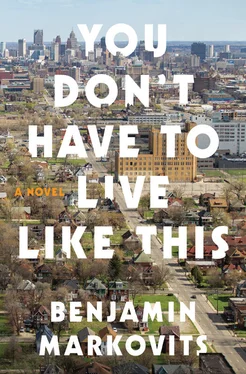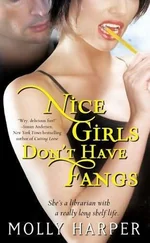It seemed like every couple of days we saw her face on TV, making her pitch. Detroit has got to get better, but who’s it got to get better for? Who are these neighborhoods really helping out? All of this started out innocent enough, but somehow the tone changed. A group of Turkish immigrants had converted an abandoned church into a mosque and community center. There were stories about where the funding came from, there were complaints about the calls to prayer. People said they felt shut out from the community center. Maybe they did, I don’t know. They felt uncomfortable. Molly Brinkley ran a political ad, about the old church and the community it used to serve. There were photographs, interviews with old ladies. She didn’t say anything you could pin against her, she was very careful, but she got her point across, too. If it’s a choice between these two groups of people. . that was her point. Even Gloria said, “Something is happening to this woman, I don’t recognize her.”
Then Nolan filed charges against Tony, for assault. The only one off the hook was me.
I felt guilty about that, too. And kept thinking about what Tony said to me, “You didn’t do shit.” Like it was some kind of failure of courage or character to stay out of the way of the legal battle. Because in some way, and I felt this strongly, it seemed to me I was in the middle of the whole thing. Yet nobody wanted to take me on. Korobkin was one of Robert’s guys. Apart from anything else Robert worried about a civil suit and wanted somebody checking up on me, on what I said. Everybody had lawyers, Tony had his lawyer, Nolan had lawyers, we had acquired these representatives and advocates and stand-ins who spoke their own language and managed to fight our battles in such a way that we hardly had to be present at all.
Korobkin asked me not to make contact with the other parties, but it seemed to me there were human things going on here I had to pay attention to. So I went to see Mrs. Smith.
By this point it was mid-July, a dripping, not very hot or cold but uncomfortable close overcast summer afternoon. Just after lunch — Gloria was seeing one of her sorority sisters. I had my lunch and then I thought, screw it, and walked the hundred yards to Nolan’s house.
His mother answered the door. “I was wondering when you would turn up,” she said.
“I’ve been meaning to.”
We went into the kitchen and Mrs. Smith put the coffee on. “Clarence is getting into his baking,” she said and pushed over a tray of sugar cookies cut into half-moons and stars. I took a mincing little bite. She fussed around with the coffee and then she poured me a cup and poured herself a cup and sat down. “Let me say first things first. When Nolan dropped that boy off, I had no idea. He said he was helping out a friend. So let me apologize for that. Let me apologize for getting you mixed up. When I heard what he did, I wanted to say, excuse me, I’ll handle this, you come here, son. You are in big trouble. But it’s not up to me. I got no say, and they talking about a life sentence. It doesn’t add up. Nolan swears to me that boy was walking in the city street. He says the kid didn’t know his way home. I can’t bring myself to disbelieve him. Now I am mad as hell about what he did next, but the only one who got hurt here is my son. That’s a fact.”
“I don’t know if you blame me for that.”
“I’m done blaming. I don’t even blame the other guy, Carnesecca. If somebody took Clarence, what do you think Nolan would do. Everybody needs to calm down. But these lawyers, they don’t let you talk.”
“That’s why I came here today.”
And she took my hand, which was on the table, in both her old-woman hands, which were very dry and warm. There was flour on them, that’s partly why they seemed so dry. After a minute she let me go.
At one point Nolan came in with Clarence. They had just been taking the dog to the park. “What’s he want?” Nolan said. Almost two months later, you could still see the scar on his face, a patch of lighter skin, as if it was dusted with flour, too. But that wasn’t me or Tony, that was Kurt Stangel, when they fought over the baseball bat.
“He doesn’t want anything. He’s paying a visit.”
“The lawyer tells me not to see you,” I said.
“I guess you’re all grown up now. Come on, Clarence. Wash hands.”
“Don’t listen to him, Greg,” Mrs. Smith told me, while they went to the bathroom. “He’s just worried. If he goes to jail, how old is Clarence going to be when he gets out.”
In fact, I started seeing Nolan more regularly after that. We even went running once. I had this idea, maybe it was a stupid idea, that Tony and Nolan could work out their differences personally, and leave the law out of it. Korobkin explained to me, the law isn’t interested in them personally. But I had an answer for that, too. The best way to fight cynicism is with deeper cynicism. These guys all know each other, I said. Everything’s personal. Robert and Larry Oh have lunch together, they have mutual interests, they talk about trade-offs. I just have to persuade all the different parties what their interests are. But Korobkin shook his head. You’ve been watching too much TV, he said. And the truth is nobody wanted to work out their differences, they wanted to fight them out.
We jogged around the neighborhood, past Butzel Park, as far as Mack Avenue. I liked seeing the houses at different stages of being worked on, the gardens in progress, guys painting fences or washing their cars on a Saturday afternoon, women outside with the kids and the plastic toys. Of course all this set Nolan off. We didn’t talk about the case much but we talked around it. I wanted to know what made him so angry; I didn’t get it. These places were scary places before people like me came along, the houses were standing empty, nature was taking over. It’s kind of terrifying, I said, how quickly weeds grow; certain trees as well. All of this architecture, which seems like such a permanent feature of the landscape, needs constant updating, home improvement, middle-class pride and ambition, or the landscape swallows it up. After a few years.
“Who said I’m angry?” Nolan said. “You got some guy setting up a roadblock outside my house, and when I complain to him, he beats the shit out of me. Some other guy kicks me in the head. And I’m the one going to jail. But if you want to talk about architecture, let’s talk about that.”
“You complained to him with a baseball bat.”
“Don’t get me wrong, I like these houses. When you all move out, we can move in.”
“Who’s we?”
The truth is, Nolan wasn’t in great shape; he looked heavy, his color was bad, his breathing sounded anxious. When we got to Mack and Conner he had to stop, so we went into the McDonald’s for refueling. I had a cup of coffee but he needed some sugar in his blood and ate two or three little hot apple pies.
We sat outside at one of those metal tables, sweating in the August heat, in the traffic noise. I said, “This city wasn’t always a black city.”
“When the white people made enough money, they moved out.”
“So now they want to move back in. And by the way, it isn’t only whites.”
“How much money have you people brought to this city that you didn’t spend on yourselves? On your schools and your houses and your neighborhoods?”
“You live in it, too. There have been jobs.”
“Mowing lawns. Security.”
From where we were sitting, we could see the old warehouse across the parking lot; a black guy in a brown uniform sat on a folding chair outside the office door, in the sunshine.
“That’s not just security,” I said. “It’s big business — they’re storing aluminum there. How long was that place sitting empty?”
Читать дальше












